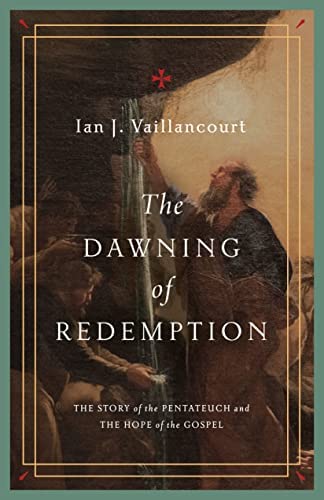⏱️ Estimated Reading Time: 4 min read
Where would you tell a new Christian to start in the Bible? It puzzled me as a young Christian why no one told me to start at the beginning, to start at Genesis. Then I read the first five books of the Bible and I understood why. Without the right helpers, those books leave believers disoriented and ready to quit reading the Bible for themselves.
Now that I’ve read Ian Vaillancourt’s The Dawning of Redemption: The Story of the Pentateuch and The Hope of the Gospel I will gladly tell someone to begin in Genesis and as they go, bring Vaillancourt with them.
The first five books in our bibles (Genesis-Deuteronomy) make up the Pentateuch, otherwise called the book of Moses (Mark 12:26). Vaillancourt’s book provides readers with a bird’s-eye view of the entire story and puts tools in our hands to “dig into its details on [our] own” (19). Through nine chapters he traces the theme of redemption from the opening curtain to the final credits of the Pentateuch.
Creation is the theater, Eden is the promise, the genealogies reveal the lineage; the covenant is God’s guarantee, and the Exodus accomplishes redemption while foreshadowing a future and better redemption. Torah (God’s instruction) teaches how to live as his redeemed, the Tabernacle, Priesthood and sacrifice are God’s provision for his redeemed to live with him. Unbelief causes delay for the redeemed, and God’s blessings and curses warn the redeemed, keeping them close to God.
The first five books of the bible contain the complete story of redemption in seed form. We probably find it easier to see the seeds in the big events- creation, the exodus, Sinai, and the wilderness wandering. But there are also notorious “boring” sections in the Pentateuch. The meticulous details for building the tabernacle, the strange and seemingly outdated guidelines for sacrifices, and the long genealogies. Put your hand up if you skim or skip those. Vaillancourt doesn’t claim to make them less boring but to help readers understand why they are there and what their function is in the story God is telling. “As our approach to every passage of Scripture is informed by the Bible’s own teaching about itself, we realize that any time we fail to encounter God in the Bible, the problem is with us, not the Bible” (72). The massive action set pieces and the long walk and talk contribute to the story bringing us before God, to encounter and worship him.
The Dawning of Redemption puts the big picture together. It is like the box of a puzzle. When you see the whole, you learn how the oddly shaped piece in your hand fits into the picture. Vaillancourt helps us see why each story, each list, and each name are in the bible and how these contribute to God’s purpose of redemption. As I read, I became more in awe of God. After all, it would be a shame to read the Pentateuch and never stand in awe of God (39).
The last section of the book is titled, “Take Up and Read.” It’s a challenge and an invitation “that if we are Christians who want to understand the gospel better, the Pentateuch is a great place to start” (207). The value of a book like The Dawning of Redemption is helping us read the Bible better. You get more out of your reading of scripture because of a book like this and conversely, you’ll get more out of Vallencourt’s book the better acquainted you are with the Bible. The Pentateuch has some thrilling sections, some mind-boggling sections and even some straight-up strange sections. But take it up, read it and bring Vaillancourt’s book along to guide you as you behold the God of redemption.



